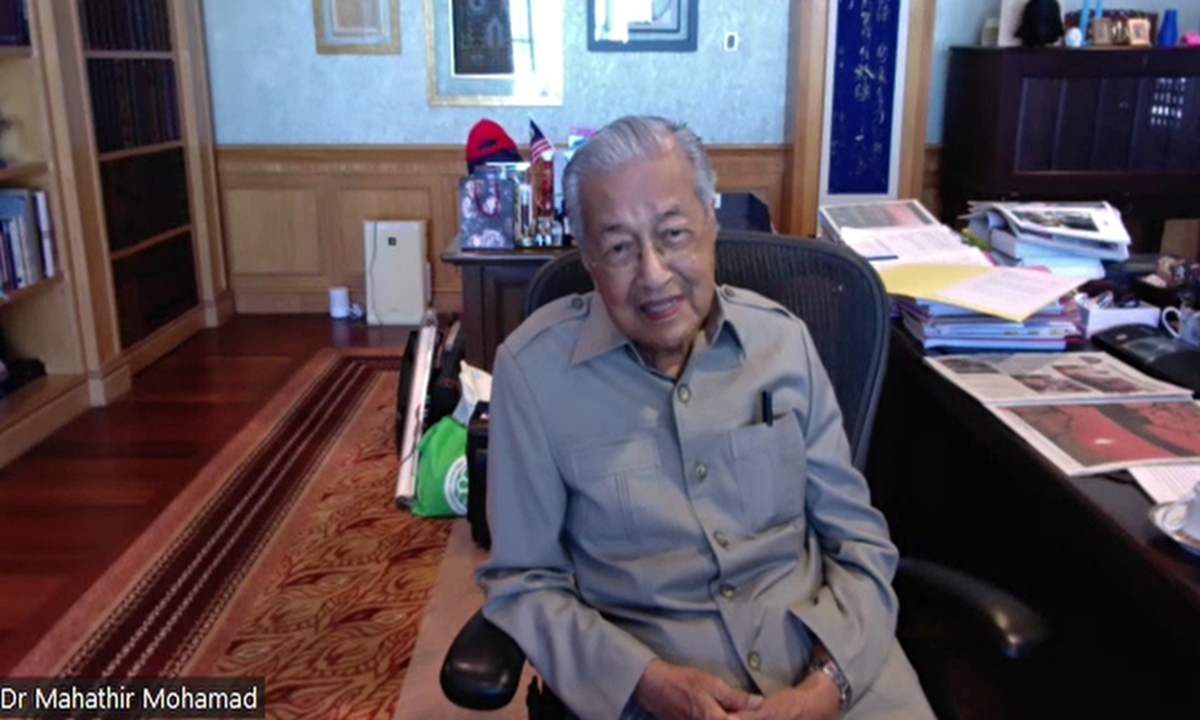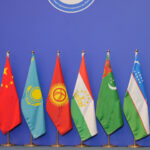Editor’s Note:
As China-US tensions have boiled over the island of Taiwan and the Ukraine crisis, Southeast Asia has kept proactive diplomacy. Global Times (GT) reporters Wang Wenwen and Bai Yunyi talked to Mahathir bin Mohamad (Mahathir), former prime minister of Malaysia, about his views on China-US relations and the global impact of the Ukraine crisis. Mahathir, who is vocal against the West, has kept a very particular place in Malaysia’s history and been an influential senior statesman in Southeast Asia. He has constantly spoken up about China-US relations.
GT: What’s your perspective of China-US relations in the next 10 years? Will there be a conflict between the two countries, especially over the Taiwan question?
Mahathir: I find that the US likes to provoke. For example, that visit by the house speaker to Taiwan is a provocation. Before that, the relationship between the Chinese mainland and Taiwan was quite calm. You had relations, but there was no confrontation. But when the US speaker visited Taiwan, the Chinese mainland responded by showing that it is against the visit, and insisted that Taiwan is a part of China.
So since then, there is tension because of the visit. And when there is tension, there is preparation for war. China will boost its own military capacity. Taiwan also is doing the same, but Taiwan has to buy the weapons from America. That means that America benefits by stoking tensions. Without tensions, America doesn’t sell weapons to Taiwan. So I hope that Americans and Chinese people will realize that confrontation and threats of war do not benefit either China or America. We should learn to live together because the world is getting smaller. We are all neighbors of each other. If we have tensions, then we’ll spend our time not enriching and developing our countries, but instead spending money on confrontation and preparation for war, which is not going to help anyone.
ASEAN countries want to be friends with all countries. We trade with China. China is our biggest trading partner. But we also have big trade with the US. So if there is peace, then all the countries will prosper.
GT: Do you think China and the US are capable of managing their ideological difference?
Mahathir: That is difficult because you have different ideologies. But like Malaysia, for example, we want to be friendly with all nations in the world, irrespective of ideology. We don’t care whether they are socialists or communists or capitalists, but we want to trade with them. That is their internal business. Don’t export your ideology, then there will be peace. So if the US does not try to promote democracy in other countries, the world will be at peace. But the idea that everybody wants to win support for their ideology is a wrong idea. People should be allowed to have their own form of government.
GT: ASEAN ministers are discussing to reduce dependence on the US dollar. What’s your take on the de-dollarization process going on in several parts of the world?
Mahathir: Long ago I suggested trading currency to be used only for trade in the ASEAN region, as well as the Northeast Asian countries. That means Japan, South Korea, and China.
If we use our own currency, obviously we will not use the US currency. If you don’t use the US currency, there is no demand for US currency. That means the US currency will be devalued. The US profits by having the US currency as a trading currency. So when we suggest that we should replace it by an East Asian trading currency, the US is not happy and they campaign against it.
Currently, a lot of countries are rejecting the use US currency for trade. Russia, for example, insists that trade should be in ruble, the Russian currency. And many other countries feel that they need to buy US currency. And when you buy the US currency, the US currency acquires high value. So if they can use their own currency or some other currency, they would like to do so. The feeling in the world today is changing. Before they accepted the Bretton Woods Agreement, which says that trade should be conducted in the US currency, now many countries want to use other currencies. My suggestion that we should have a currency for trading in East Asia is now something that is acceptable to many countries.
Whenever you have that, then you can value your exports against your imports. If imports are bigger than your exports, then only you pay. If not, you don’t pay. In a way, it is a kind of better trading that you do not exchange goods, but you exchange the value of the goods that you trade with. For example, if Malaysia sells more to China, in the following year China will have to increase its exports to Malaysia in order to balance the trade. Otherwise, China will have to pay Malaysia the difference within Malaysia’s exports. The difference will be in a special trading currency.
GT: How do you assess the implications of the Ukraine war on the global order?
Mahathir: I am against war. War doesn’t solve anything. A lot of people will be killed, a lot of damage will be done. In the end, they will have to find some settlement. It is better for them to talk to each other, to discuss, to negotiate, to arbitrary or to go to a court of law, to settle their problem. I find that there is no necessity for the Europeans to be divided between East and West, because they are always confronting each other, always thinking about war against each other.
They will settle problems through military strength, it’s not a very good idea because they have fought wars before. And even if they win, they still lose a lot. So war doesn’t solve problems.
In Europe, Ukraine was at one time in the Russian bloc, but Russia decided to free Ukraine. I think Europe should feel very happy about that, but they wanted Ukraine to go against Russia to join NATO. And when that happens, Russia feels threatened. The invitation to Ukraine to join NATO is a provocation. In fact, if Ukraine doesn’t join NATO, I think Russia will feel less threatened, and there will be no confrontation. But once the process is started, Russia will take preemptive action.
Now, there is a war between Russia and Ukraine, but NATO nations are not involved, because Ukraine is not a member of NATO, so they don’t have to fight together with Ukraine. But for Ukraine, they have to fight against Russia, and that is causing them a lot of losses.
China has taken a new role that is unusual, because China now has become a peacemaker. China is trying to solve the problems between Ukraine and Russia by urging them to make peace and to settle their problem. This is a good role for China. Already, China has succeeded very well as a peacemaker. For example, the confrontation between Iran and Saudi Arabia has been going on for more than 40 years. But after China intervened, now there is no more confrontation between Saudi Arabia and Iran. So that is a great success for China. And China should continue. Then China will be recognized as a country that wants to see peace in the world and to promote trade and joint prosperity.
The US and NATO don’t want to see China play this role, but the fact is that the war is not going to solve their problem. They can keep on fighting and killing. And maybe Ukraine will be totally destroyed. And yet, there is no victory for either Russia or Ukraine. There will always be confrontation between them.
GT: How likely is the war evolves into a world war?
Mahathir: Already, we are affected. The rest of the world is affected. The cost of living has gone up. Supply of grain, for example, which comes from Ukraine, is now difficult to get. So this affects all the other nations in the world. The US will try to get other countries to join in the action against Russia, and Russia will also have to find friendly countries which will support it. There will be confrontation between the Eastern bloc and Western bloc. And this will escalate and become a world war.
GT: What’s the difference between Asian values and the West-touted “universal values”? Why are you so optimistic about Asia?
Mahathir: We see differences within Asian values and Western values. For example, today, Western people are very liberal, they have already discarded many of their moral values. Marriage is not respected anymore. Even families are given different interpretations. Everything is about freedom. Many of the values in the West have changed.
But in Asia, we still embrace our own values. We still think that moral values are very important. We still respect institutions of marriage and family. China, for example, is still guided by people like Confucius. We retain our own values. Westerners have discarded their values.
Beyond that, politically, the West wants you to change and become a democracy, overthrow government, set up new regimes, and they do it in a way that is very disruptive.













